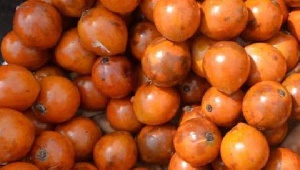African star apple popularly known as Alasa in our local parlance has been a popular fruit among school-growing children in Ghana for some time now. It is not uncommon to see something purple-like nicely arranged pyramidal on a flat pan in a school compound or in a traffic on our highways.
This sweet-sour fruit is believed to be potent as a natural remedy for common conditions like constipation, toothache, sore throat, and indigestion. Its popularity is not only for its edibility but also useful for herbal practitioners as it is believed the bark of its tree is often used to treat
yellow fever and malaria while the leaves are for the treatment of wounds and stomachaches.
However, there is a growing trend to this organic fruit as far as its consumption is concerned- the addition of saltpeter (potassium nitrate) to the fruit and eating them together. The assumption is that if not completely eliminate its sour taste, reduce it to the bearable minimum to make it sweet.
But could this act be detrimental to our hearts as humans? What is saltpeter made of?
Potassium nitrate or saltpeter is basically salt (sodium) and nitrate. High intake of sodium as an extracellular fluid of cells has long been associated with high blood pressure. It is an already established fact that most Africans eat 10 times more salt than they need. How much of sodium do we need in a day? The Recommended Daily Allowance (RDA) is 5 grams per day equivalent to 1 teaspoon.
The possibility of going more than the recommendation is plausibly high when
eating with Alasa since the goal is to get rid of the sour taste and make them sweet. This is especially dangerous among children as their sense of taste is often dependent on instinct, emotions, curiosity, and even competition among peers rather than rationale. In fact, high BP is not common among children statistically, and neither is it zero for them.
Primary or essential hypertension with no known cause tends to develop gradually over many years and the head start could be right from childhood.
Conclusion: The amount of saltpeter consumed daily could have a direct link to our health as it has the potential to raise one’s blood pressure.
Nitrate: One cardinal use of nitrites and nitrates is meat processing. Potassium nitrates are often used as the common ingredient in the cure of red meat.
In meat processing, potassium nitrate reacts with hemoglobin and myoglobin generating a red color, the very reason our ‘delightful’ sausages and hamburgers are reddish.
However, it is reported that this practice is discontinued because it gives slow and inconsistent results to the meat.
Since October 2015, WHO (World Health Organization) has classified processed meats like sausages which often use potassium nitrate in their preparation as Group 1 carcinogen (cancer-causing agent) globally.
It is imperative to note that in April 2023, a French Court of Appeal of Limoges upheld an earlier ruling that an NGO in the food industry was legally legitimate in describing potassium nitrate as a cancer risk.
In most Ghanaian cuisines, saltpeter has been widely used as a thickening agent in soups and stews especially okra soup. It is also used to soften food and reduce cooking time when boiling beans and tough meat; a practice often generally criticized by many people as too much of it usually leads to diarrhea.
Conclusion: Too much nitrates can have serious health effects on humans. Nitrates have a history of medical use, but it is toxic in high doses and can produce symptoms ranging from mild headache and stomach upset to kidney disease and dangerously altered blood pressure.
Other uses: Saltpeter from a taste of it has always been sharp, salty, and bitter as its intrinsic characteristic. This makes it corrosive by nature.
It is no wonder that this human-consuming ingredient has other major uses ranging from being used as fertilizer, tree stump removal, and rocket propellant to fireworks. It is often used by our mothers as a ‘silver shine’ or aluminum cleaner.
With this other side of saltpeter, is there a possibility of causing stomach ulcers or raising the acidity content in our stomach when consumed in excess?
Conclusion: Saltpeter is sharp, salty, and corrosive, a direct recipe for stomach conditions other side, especially stomach ulceration.
Finally, why do we want to pour sand into our gari thinking that both are grains? God in his infinite wisdom created every fruit and vegetable with its distinctive color, taste, and smell.
Let’s not deceive ourselves that nature could be changed somehow by our efforts and get the same results from nature implications could be dire for our health.
Health News of Friday, 2 February 2024
Source: Kaakyire Yaw Obiri Yeboah

















